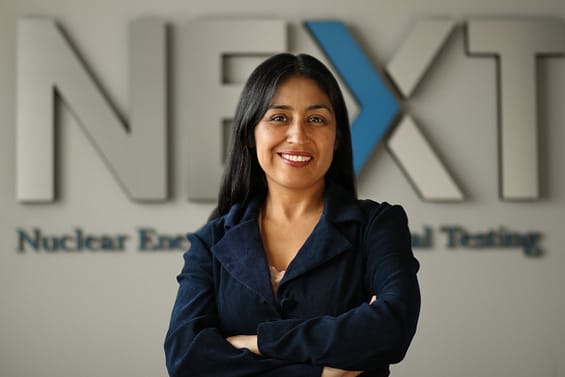
When Rosario Gibbs gave a presentation recently to a consortium of universities working with ACU’s NEXT Lab to develop a molten salt nuclear reactor, her first slide was of head coach Joe Golding and his NCAA Division I Southland Conference championship basketball team.
Golding’s motto throughout the season, “trust the process,” is just as applicable to the cutting-edge research being done at ACU, she said. And in the same way last season’s double conference win by the men’s and women’s basketball teams and their entry into March Madness put ACU on the map in terms of basketball, she believes the NEXT Lab is putting ACU on the map in terms of research.
For Gibbs, who is an industrial engineer and NEXT Lab project manager, trusting the process is key, and her expertise in creating and implementing processes is critical to keeping research in the lab running smoothly.
“In industrial engineering, we are the specialists in processes, in making things work more efficiently,” she said. “Our goal is to always manage resources for the best outcome.”
NEXT is an acronym for Nuclear Energy eXperimental Testing Laboratory, a program that is experimenting with using molten salts, rather than water, as a coolant for nuclear reactors. Inside the lab, students and faculty conduct experiments that could someday lead to global solutions to the world’s need for energy that is less expensive, water that is pure and abundant, and medical isotopes used to diagnose and treat cancer.
“The type of technology we are developing is going to play a key role in the future of the entire planet,” said Gibbs, who joined the team at ACU in March. Her husband, Nathan (’00), also works for ACU as general manager of KACU-FM and director of operations for the university’s Doug and Jayne Orr TV Studio. He is an assistant professor of journalism and mass communication.
A native of Mexico, Gibbs earned her engineering degree from the National Technological Institute of Mexico in Tijuana. Starting as a junior in college and continuing after graduation, she worked for a number of Japanese and American companies, including Sony, Canon and Flextronics, a corporation that manufactures products for major brands including the Apple iPhone.
Before coming from California to ACU, she was an engineer at The Boeing Company, working on technology to develop smaller satellites. It was a world vastly different from academia but in need of someone with Gibbs’ skills.
Industrial engineering encompasses elements of every other engineering discipline, Gibbs said. “We have to understand every piece of the puzzle, so we can manage all those pieces together and make them work better.”
When Gibbs starts a new job, “one of the first things I do is educate myself with everything related to the project I’m going to be working with,” she said.
Dr. Lori Houghtalen, associate dean of the College of Arts and Sciences and an assistant professor of engineering and physics, said Gibbs’ passion for learning has served her well.
“She uses her education and experience in engineering as a jumping-off point to acquire new knowledge and apply it to the context in which she is working,” Houghtalen said. “Since joining NEXT, she has read everything she can get her hands on and has attended workshops to understand more about molten salt reactors and get up to speed in her new area of application.”
Gibbs also brings strong communication skills to the team, Houghtalen said. “A project manager spends a majority of the work day communicating – to team members, with stakeholders, with suppliers, etc. I’ve been impressed by the clarity and intentionality with which Rosario has approached this aspect of her job. She seeks input from all relevant sources and is able to discern a productive path forward for collaboration.”
Gibbs seeks opportunities to mentor students on the NEXT project, creating group and individual learning opportunities, and setting an expectation for students to discuss their work in collaboration meetings.
That interaction with students, Gibbs said, is one of her favorite parts of her job.
“We have a lot of students working in the NEXT Lab,” she said. “I tell them, ‘It’s great that you’re getting your degree from ACU because of what you’re going to learn in the NEXT Lab. It’s the perfect complement to your education. The things I’m teaching you are things that will give you a big advantage when you graduate and get a job.’ ”
